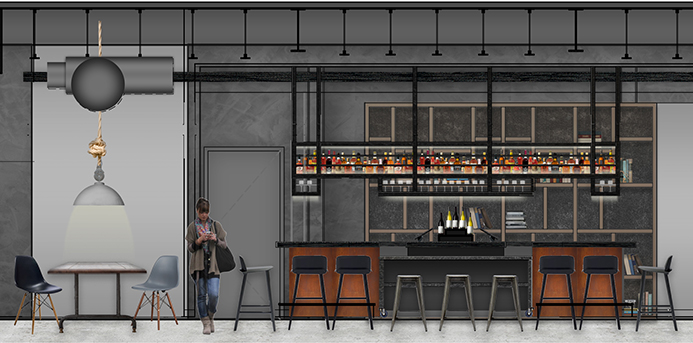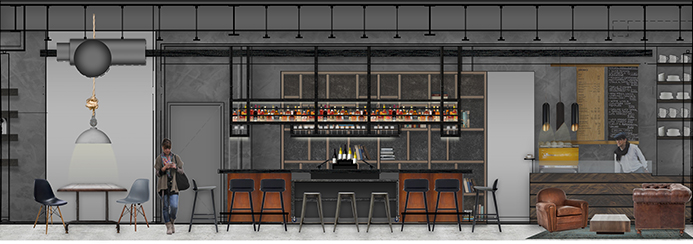Long known for their inventive, groundbreaking shows, Steppenwolf Theatre will soon stage a different type of opening.
This May, the curtain rises on Steppenwolf’s newest productions: Front Bar and The 1700 Theatre, both contained in the old Ethan Allen furniture store space directly north of the Steppenwolf Theatre building. Steppenwolf bought the space in 2012, moving their offices to its second floor and connecting the buildings on both levels. A new, flexible black-box theater will take up the back half of the first floor, while the all-day café and bar will have pride of place in front, facing the street.
According to David Schmitz, managing director of Steppenwolf, a series of audience surveys helped point the way to this new configuration. “We were trying to figure out how to elevate the theater-going experience,” he says. “We want to create a cultural hub in the community, and be the kind of place where there is always something happening.”
“Steppenwolf is a familial environment, “Artistic Director Anna Shapiro says. “For a long time, we have craved a comfortable setting where our audiences, artists, staff and friends can interact — the [Front Bar] is the perfect solution.”
Theater is all about collaboration, so it’s no surprise that Steppenwolf turned to the award-winning Boka Restaurant Group (BRG) to help build Front Bar. BRG co-founders Kevin Boehm and Rob Katz are responsible for creating Girl & the Goat, Momotaro, Swift & Sons and Balena, among other über-popular restaurants, and are no strangers to pulling together productive, creative projects.
Halsted Street neighbors and friends for the past 13 years (their first restaurant, Boka, is down the block, and Balena is across the street from the theater), Boehm and Katz were thrilled to work on the project, bringing in their own dream team — Chef Chris Pandel (Swift & Sons, Cold Storage, Balena) to curate the menu, Karen Herold of Studio K to design the space and Kevin McConkey of Grip to brand and market the project — to help.
“What we liked about what they were telling us was that they were looking to do something not just as an extension of the theater, but something that was cool enough that could have its own independent draw,” Boehm says.
The original idea behind the new café and bar, according to Boehm, was “a longing for O’Rourke’s,” the long-demolished bar where Steppenwolf ensemble members and audience alike once congregated after a play. It was the kind of bar where you might’ve seen Studs Terkel and Roger Ebert conversing with Gary Sinise and John Malkovich after a particularly intense performance.
“All theaters need great bars,” Schmitz says. “The performers want to transition out of that intense emotional experience in the same way that the audience does, and now they will be able to do it together.”
With only 50 seats, many of them located around the large four-sided bar that dominates the center of the space, Front Bar is still somewhat intimate. There will be standing room, of course, as well as casual couches and furniture to lounge upon. During the day, even when the theater itself is closed, Front Bar will operate as a coffee shop serving Pandel’s menu of bakery and breakfast items, soups and sandwiches. Boehm feels that it’s a needed extension for both Steppenwolf and the surrounding neighborhood.
The 1700 Theatre, a multi-genre, flexible performance space, will be a vital part of this creative community hub, taking over that function from the existing Steppenwolf Garage, which will be maintained as a rehearsal space. Upcoming performances include a podcast festival curated by WBEZ’s Tyler Green; a vaudeville comedy piece with long-time Steppenwolf Ensemble member Laurie Metcalf; live music acts; and partnerships with both visiting and local companies.
If Front Bar goes the way of other BRG restaurants — and Steppenwolf plays, for that matter — it will be a smash hit from the get-go. Boehm, who knows a thing or two about the subject, finds that immediate success is nice, but it’s sustainability that really matters.
What creates sustainability in terms of a restaurant’s allure? “It’s the alchemy of food and beverage, hospitality and design,” shares Boehm. “We live in this kind of A.D.D. society where it’s difficult to constantly stimulate people. So we aren’t just trying to create spaces with great food and hospitality, but spaces that keep continuing to feel interesting to people when they are inside of them.”
Shapiro feels that the improved and expanded Steppenwolf complex promises to become a cultural destination that everyone can enjoy. “We have the best team in Chicago assembled,” she says. “We can’t wait to open our doors to the community.” Come mid-May, they will do just that.
More from Make It Better:


